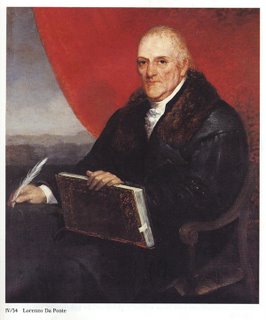
Mozart and the Jews
It is about 85 degrees here, with 95 percent humidity, and the air conditioning in the room was broken last night. I have decided to focus my work this week on Mozart's Jewish connection. To your left here is Lorenzo da Ponte, the brilliant librettist for both The Marriage of Figaro and Don Giovanni. I just read the libretto of the former while I was in Venice (I have been trying to upload some photos but it's having problems) and realize what a genius he was in his own right. He ended up leaving Vienna after Mozart's death and moved to New York, where he was the first professor of Italian literature at Columbia College. He also helped to finance and build the first opera house in the U.S. when he was a very old man. What a cool guy. He was a Jew, but had converted to Christianity like many famous and successful Jews (such as Mahler) in Vienna.
On a side note, Otto Preminger, another Viennese Jew, was offered the directorship of the National Theater here on the condition that he convert, but he refused and ended up, as you know, moving to America. How did I find this out? I went on the "Jewish Vienna" tour today, and visited one of two Jewish museums here.
"We were looking for a nicer place to live," writes Mozart to his Dad in 1783, "and we found one at the Judenplatz." This is the site of one of the two Jewish museums, and the Holocaust memorial which was built in 1999. Mozart lived there for a short time, and his oldest son (who died when he was about 2 months old) was born there. Underneath the Judenplatz in 1995, archaeologists found the remains of the medieval synagogue, which was probably built in the 13th century but which was destroyed in the great pogrom of 1421. It was amazing to go underground and see it today; it's directly underneath the Holocaust memorial.
Jews, especially Jewish musicians, have a huge history here, and in honor of my Dad and Lorenzo da Ponte and Korngold (who wrote the score to my favorite movie) I have decided to dedicate much of my research this week to Jewish history here. Some of my colleagues and I have also planned a visit to Mauthausen on the last weekend we are here. That's the main concentration camp outside Vienna, where 50,000 people died. I will let you know more as events unfold but it is a fascinating and moving history to learn.


0 Comments:
Post a Comment
<< Home